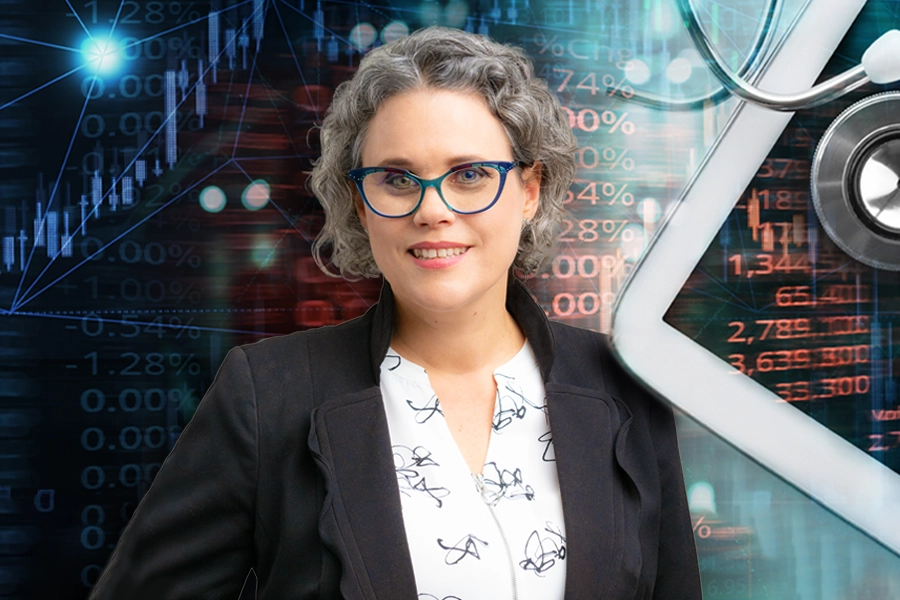
The Business of Life Sciences
Thinking critically about data has defined double alumna Pamela Bush’s career
By Sally Parker
Carnegie Mellon University alumna Pamela Bush remembers borrowing winter clothes for a trip from her home state of Florida to interview for the biology Ph.D. program in the Department of Biological Sciences.
“I came for an interview, and I almost froze,” says Pamela, who received a Ph.D. in biological sciences from the Mellon College of Science in 2002 and a MBA from the Tepper School of Business in 2009. “But I absolutely loved the school. My goal, when I came to Carnegie Mellon, was I wanted to work in oncology. I wanted to find a cure for cancer.”
Pamela has built a career pursuing that goal with executive and consultant roles in life sciences business development. Most recently, she was the chief business officer of Predictive Oncology, a life sciences company that uses artificial intelligence to develop personalized cancer therapies. She led strategic, operational and financial planning initiatives.
Drug development is going through a major transformation with the use of AI and machine learning, Pamela says. Big data and large language models are making every step of the process, from discovery to clinical trials, more efficient, more effective and exponentially faster.
“These were classes that included a lot of journal reading. We were learning how to critically think about the data that was being presented and the conclusions that were being drawn. They were teaching us how to be critical-thinking scientists.”
In her first year as a doctoral student, a class on the molecular biology of animal and plant cells and one on advanced genetics convinced Bush she was on the right track. Both courses required deep analysis of published studies.
“These were classes that included a lot of journal reading,” she says. “We were learning how to critically think about the data that was being presented and the conclusions that were being drawn. They were teaching us how to be critical-thinking scientists.”
Professor of Biological Sciences John Woolford became a mentor to her. His lab conducted research in yeast protein-RNA interactions. At the bench, Pamela studied how the protein-making machinery of yeast cells works, what happens when the process crumbles and how it differs from human cells.
“They’re translatable to bacteria — very translatable to the development of antibiotics, for example,” she says. “You want to understand what are the differences, and what are the similarities, and that way you can develop medicine.”
One of the coolest things about the biology program, she says, was finding professors who encouraged students to seek careers outside of academia. Pamela knew she wanted to work in business. During her Ph.D. program, she took classes without credit at the Tepper School.
At Woolford’s encouragement, Pamela pushed herself to talk to science faculty members who were working to license technology and start their own companies.
“I didn’t know how to network outside of the university,” she says. “It’s actually terrifying, when you are a graduate student that has spent six years inside the walls of the university, to start networking with people in industry.”
Pamela got married while in the Ph.D. program to Jason Bush, who earned a Ph.D. in chemical and bioengineering in 1999 from the College of Engineering. After graduation, she joined the Pittsburgh Life Sciences Greenhouse, a regional accelerator for health tech startups backed by the Commonwealth of Pennsylvania and area universities.
“Everybody should be a scientist. I don’t know why everybody’s not a scientist. I absolutely love it. It is the coolest thing to work in science at the intersection with business.”
Pamela says she liked being in a place of possibility and potential, where promising life sciences technology could develop. She helped entrepreneurs write grant proposals to angel and venture capital investors for funds to commercialize technology and launch businesses.
“I enjoyed evaluating science from a business perspective and applying business concepts and investment decision-making based on different scientific merits of the technology,” she says.
After five years, she returned to Carnegie Mellon to earn a MBA at the Tepper School. There she found the same focus on data and critical thinking that she had in her Ph.D. program.
“It’s not data for data’s sake,” she says. “What is the question that you’re trying to answer?”
She has had to make this distinction repeatedly in meetings over the years.
“I’m always asking: What is really the question that we’re trying to answer here?” she says. “And then let’s put time into aligning and clarifying what that question is. Then we can go and look at the data that we have and see if we can answer that question or not. That is actually something that I always have taken with me.”
Pamela’s first job after receiving her MBA was working in finance at Eli Lilly and Company. She went on to executive and consultant roles at pharmaceutical, biological and life sciences research firms, including Eli Lilly, where she moved up to direct business development transactions and immunology customer support.
Cancer remains a top concern: In addition to her work at Predictive Oncology, Pamela was a strategy consultant for a contract research outfit that provides cancer drug development services to pharmaceutical and biotech companies.
As a double Carnegie Mellon alumna, Bush fields queries from science students who want to move into industry, like she did. She says she would like to do more, perhaps help the university develop programs that position science students for jobs in the business world.
“Everybody should be a scientist. I don’t know why everybody’s not a scientist,” Pamela says. “I absolutely love it. It is the coolest thing to work in science at the intersection with business.”